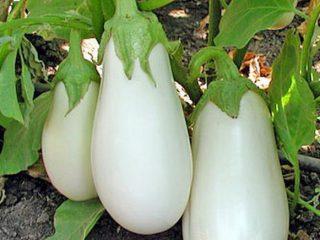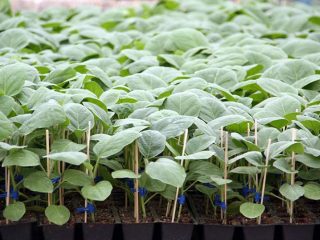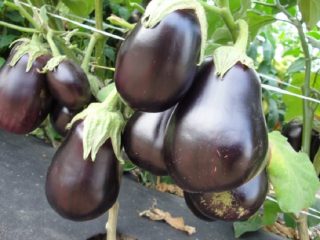Content
Eggplants do not set in the greenhouse for various reasons. They are mainly associated with care disorders. For example, the greenhouse may be too hot and humid. Then flowers will appear, but they will not bear fruit. Another harmful factor is malnutrition. For example, if you give an excessive amount of nitrogen during the appearance of buds, then there will be little ovary. To get a good harvest, all factors must be taken into account.
Why don't eggplants bear fruit?
There are quite a few reasons why plants do not produce ovaries. They may bloom normally, but not form fruit. The main factors are described below.
Poor quality seeds
If the eggplant does not set, the reason may be due to poor quality seeds. You need to purchase them only from trusted manufacturers, keeping an eye on expiration dates. In this case, varieties and hybrids should be carefully selected, taking into account the climatic characteristics of the region.
Unsuitable soil
If the eggplant does not set fruit, it may also be due to unsuitable soil.Plants are demanding of the soil - it must be loose and fertile, with low density. The optimal pH is from 6 to 7 (slightly acidic and neutral reaction).
It is worth understanding that eggplant does not grow well on clay and podzolic soils. Acidic and cold soils are also unacceptable for it. Therefore, if the land on the site is infertile and dense, it should first be fertilized and sand added. If necessary, measure the acidity using indicator paper or a pH meter.
Violating Neighborhood Rules
Eggplants can produce barren flowers in a greenhouse and in open ground due to improper proximity. It is best to grow them in separate greenhouses. But if this is not possible, you must follow the rules of crop rotation:
- Good neighbors of the plant are: peas, beets, zucchini, cabbage.
- Poor proximity to tomatoes, potatoes and other representatives of the same family (nightshades). Otherwise, this may provoke a massive invasion of Colorado potato beetles.
- Do not grow eggplants in the same place for more than three years in a row.
- Avoid predecessors with common diseases and pests (bell peppers, potatoes, tomatoes).
- It is known that eggplant grows and sets well if its predecessors were representatives of pumpkin, legumes and cruciferous plants. These are, for example, cucumbers, cabbage, radishes, radishes.
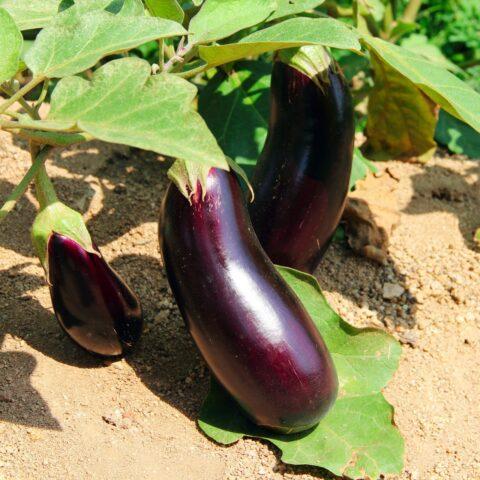
It is better to plant eggplants after pumpkin, cruciferous and legumes
Improper watering
If the eggplants have few ovaries, the reason may be due to improper watering. These plants are very demanding of water. It must be given regularly, maintaining optimal humidity of both soil and air. If there is stagnation of moisture, the roots will be deprived of oxygen.This will lead to a lag in development, sometimes even to the death of the bushes.
Temperature violation
If eggplants bloom but there are no ovaries, the reason may also be due to a violation of the temperature regime. The culture is thermophilic and grows well in the range from 22 to 27 degrees. If the temperature is 15-17 or lower, growth will stop.
Sometimes frosts occur precisely during the flowering period - in this case, eggplants do not set in open ground. Therefore, in many Russian regions it is customary to grow such plants in greenhouses.
Nutrient deficiency
If eggplants do not set fruit, it may also be due to a nutritional deficiency. The lack of potassium and phosphorus compounds, and of microelements - boron and magnesium, has a particularly bad effect. At the initial stage of cultivation, nitrogen deficiency is harmful, since it stimulates cell division and the growth of green mass.
Abuse of nitrogenous compounds is also dangerous. If they are actively introduced at the flowering stage, eggplants in the greenhouse and in the open ground do not set fruit well. Therefore, at the budding stage, it is necessary to feed with potassium sulfate, superphosphate, and carry out foliar treatments with boric acid.
Why do eggplants bloom but not set?
Often eggplants bloom, but the fruits do not set, i.e. barren flowers are formed. This phenomenon is due to the reasons described above. But there may be other factors:
- An excessive amount of pollen is formed, as a result of which it sticks together and does not fall off. Therefore, fertilization does not occur.This is most often observed in conditions of high humidity in greenhouses.
- Also, eggplant does not set due to the use of infertile seeds. For example, a gardener collected seeds from a hybrid that is not capable of producing offspring, or purchased them from an unverified supplier.
- The fruit does not set due to pest invasion. The Colorado potato beetle is especially dangerous. It gnaws the peduncle, causing flowers to appear but unable to form fruit.

Flowering and lack of ovary may be associated with high humidity in the greenhouse
What to do if eggplants do not set well
It is necessary to carefully choose the variety. As a rule, eggplants are grown in a greenhouse. For such conditions, the most suitable varieties are:
- Alekseevsky;
- Philemon;
- Hippopotamus;
- Purple miracle;
- Bibo (hybrid).
Before planting, the seeds must be checked. To do this, dissolve a tablespoon of salt in one liter of water and immerse them for at least half an hour. If any seeds float to the surface, you should not use them. When seedlings begin to be grown from them, the eggplants bloom well, but do not set even in a polycarbonate greenhouse.
Another important measure is site preparation. The soil should be fertile and loose. Therefore, several months before planting, the soil is dug up and fertilized with organic matter (compost, humus) in an amount of 7-10 kg per 1 m2. If the soil is dense, sand or sawdust should be added to it - up to 1 kg or more (for the same area).
If necessary, pH is measured. If it is less than 6.0, it is necessary to add dolomite flour or wood ash (200-300 g per square meter). If the soil, on the contrary, is alkaline, it is acidified, for example, with a 9% vinegar solution (100 ml per 10 liters of water per 1 m2).
Plants are provided with normal watering.When an eggplant doesn't set, it may be lacking moisture. Therefore, you should give water at least twice a week, making sure that the soil always remains slightly moist. The liquid is first left to settle at room temperature.
It is also necessary to provide normal nutrition. Fertilizers are applied at least three times per season. Immediately after transplantation, they are fed with nitrogen compounds, for example, ammonium nitrate - 20-25 g per 10 liters. During the formation of buds, superphosphate (40 g per 10 l) and potassium salt (25 g per 10 l) are given. You can also use complex fertilizers, for example, Kemira Lux.
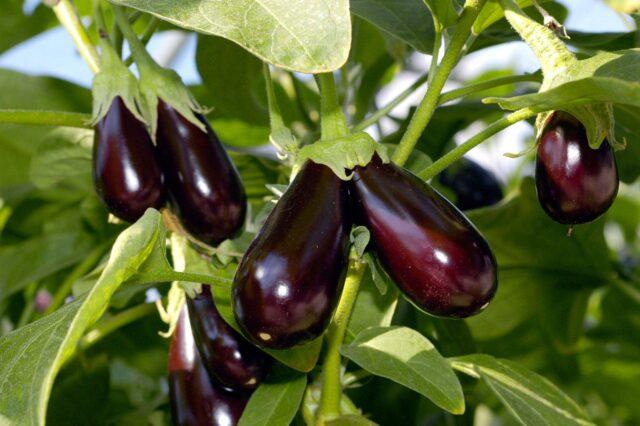
Regular application of fertilizers ensures good yields
Another important point is preventive treatments against insects and pests. To do this, you can use folk remedies, for example, an infusion of wood ash, herbs (wormwood, celandine, dandelion). But if a lot of Colorado potato beetles and other insects are found, it is worth using insecticides:
- "Tanrek";
- "Fury";
- "Aktara";
- "Kinmiks" and others.
To prevent late blight and other fungal infections, fungicides are used:
- "Maksim";
- "Ordan";
- "Skor";
- "Bordeaux mixture" and others.
Treatment should be carried out in the absence of rain and strong wind. It is better to do this late in the evening or early in the morning.
Preventive measures
If the eggplant does not set, you can cope with the problem. But it's even better to avoid it. To do this, experienced summer residents recommend taking the following preventive measures:
- Select a suitable variety for cultivation, taking into account the climate of the region. For example, late-ripening eggplants should not be cultivated in Siberia. Such a fruit sets, but may not have time to fully form.
- Carefully choose a planting site, taking into account neighbors and predecessors. It is also worth considering that eggplants need a lot of sun and should be protected from the wind. Stagnation of water is also unacceptable, so lowlands should be excluded.
- Seedlings should be carefully prepared. Two weeks before transplanting into the ground, they begin to harden it by taking it out onto the balcony or terrace. First, the seedlings are kept for several minutes, then the time is increased to 3-6 hours. On the last night, they are left outside or in a greenhouse and then replanted.
- If the fruits do not set, the plant can be helped by foliar treatment. During the flowering period, it is recommended to spray eggplants for ovary with a stimulant solution, for example, “Bud” or “Ovary”.
- The greenhouse should be ventilated regularly. This is necessary in order to ensure not only optimal temperature, but also normal humidity. If at night the temperature does not drop below 17-18 degrees Celsius, the greenhouse is left open all the time. If frosts are expected, you need to take care of additional shelter - otherwise the fruits will not set.
- Do not plant too densely in the greenhouse or in open ground. If there are many plants, they will not receive enough sunlight. This increases humidity and the likelihood of disease spreading. As a result, the eggplant does not set.
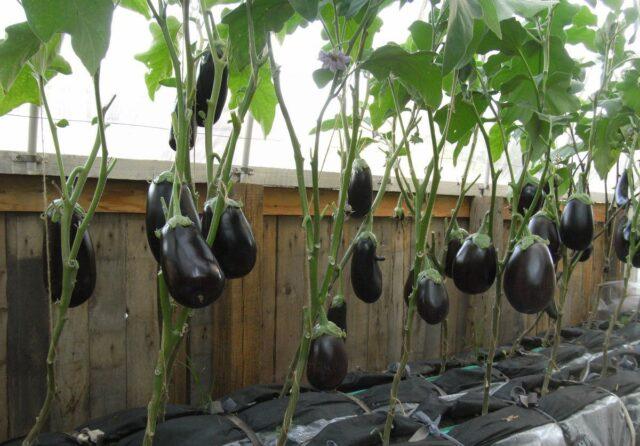
Fruits develop well when grown in greenhouse conditions
Conclusion
If eggplants do not set in a greenhouse, the reasons are often related to improper care, choosing the wrong variety, or low-quality seeds. Weather can also affect fruit formation. Eggplant does not set well in cool conditions and is negatively affected by night frosts.Therefore, in most Russian regions, such crops should only be grown in greenhouses.


